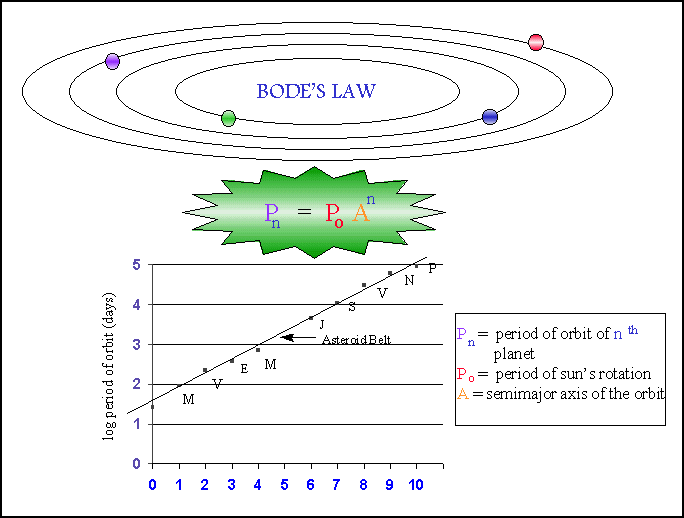

The Titius-Bode Law is rough rule that predicts the spacing of the planets in the Solar System. The relationship was first pointed out by Johann Titius in 1766 and was formulated as a mathematical expression by J.E. Bode in 1778. It lead Bode to predict the existence of another planet between Mars and Jupiter in what we now recognize as the asteroid belt.
The law relates the mean distances of the planets from the sun to a simple mathematic progression of numbers.
To find the mean distances of the planets, beginning with the following
simple sequence of numbers:
| 0 | 3 | 6 | 12 | 24 | 48 | 96 | 192 | 384 |
With the exception of the first two, the others are simple twice the value of the preceding number.
Add 4 to each number:
| 4 | 7 | 10 | 16 | 28 | 52 | 100 | 196 | 388 |
Then divide by 10:
| 0.4 | 0.7 | 1.0 | 1.6 | 2.8 | 5.2 | 10.0 | 19.6 | 38.8 |
The resulting sequence is very close to the distribution of mean distances
of the planets from the Sun:
| Body | Actual distance (A.U.) | Bode's Law |
| Mercury | 0.39 | 0.4 |
| Venus | 0.72 | 0.7 |
| Earth | 1.00 | 1.0 |
| Mars | 1.52 | 1.6 |
| 2.8 | ||
| Jupiter | 5.20 | 5.2 |
| Saturn | 9.54 | 10.0 |
| Uranus | 19.19 | 19.6 |

